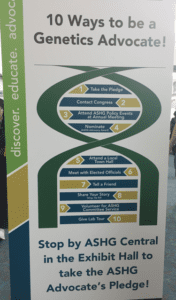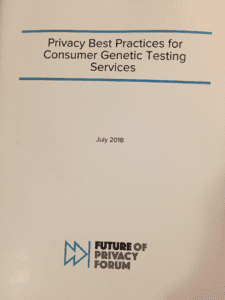Policy and Advocacy Activities at ASHG 2018
November 2018

One of the many opportunities afforded by this year’s ASHG Annual Meeting in San Diego was the chance to highlight important policy issues affecting genetics, as well as learn more about the Society’s efforts in policy and advocacy. I attended two sessions at this year’s meeting focused on policy and advocacy: the ASHG Advocacy panel session and the Policy Luncheon.
The advocacy session focused on what the genetics community can do to effectively communicate the importance of long-term investment in genetics research and how ASHG is spearheading these efforts.
- ASHG President David Nelson spoke about his own experience advocating for research funding on Capitol Hill with members of the Fragile X community and highlighted the efforts of other ASHG members, such as those who recently attended the Rally for Medical Research.
- Jennifer Zeitzer, BA, Deputy Director of the Office of Public Affairs at Federation of American Societies for Experimental Biology (FASEB), provided an overview of the funding structure for biomedical research at the national level and information about the various FASEB resources, such as detailed federal funding allocation data for all states and districts.
- Jillian Galloway, MS, Science Policy Analyst at ASHG, presented ASHG’s advocacy resources, specifically the new online Advocacy Center, which was launched last year. It features tools which allow members to send customizable messages to their members of Congress, ASHG’s press releases on important policy issues relevant to the society, the option to pledge to become an ASHG advocate, and various other useful tools.
By becoming an advocate, you can receive advocacy updates from ASHG to help you stay informed about the latest issues in Washington affecting the genetics community and action items you can complete to be a part of the genetics community’s collective voice on these issues.
The event concluded with a question and answer session, in which issues were discussed that were particularly pertinent to trainees, such as how a researcher can go about organizing a tour of their lab for an elected official and how small groups, such as student-led campus science policy groups, can effectively be a part of the advocacy effort.

The Policy Luncheon covered a very salient problem for the genetics community: the issue of privacy. This past year marked the tenth anniversary of the passage of the Genetic Information Nondiscrimination Act (GINA). The challenge of genetic privacy has only become more complex over the past decade, with substantial increases in the number of individuals receiving genomic data and advances in technology that allow for accurate identification of individuals based on that data. Researchers have an interest in sharing and accessing data, but this can only be done with proper safeguards in place to protect the privacy of these individuals.
Guidelines for consumer genetic testing services developed by Future of Privacy Forum in conjunction with participating genetic testing companies in order to protect the privacy of consumers.
The luncheon featured Stephanie Devaney, PhD, Deputy Director of the All of Us Research Program, Jennifer Wagner, JD, PhD, Associate Director of Bioethics Research at Geisinger, and Carson Martinez, MA, a Policy Fellow at Future of Privacy Forum.
- Stephanie Devaney provided an overview of the All of Us Program and the measures the National Institutes of Health (NIH) is taking to protect patient data, including tiered access to data and a Certificate of Confidentiality, which allows researchers receiving court orders or other external requests for sensitive information on research participants to protect their privacy.
- Carson Martinez discussed the Privacy Best Practices for Consumer Genetic Testing Services that the Future of Privacy Forum developed in conjunction with several testing companies. Areas covered by the guidelines, a copy of which was given to everyone in attendance, include transparency and education, data access and deletion, law enforcement access, and consent and third party sharing.
- Jennifer Wagner reviewed the legal framework of GINA and its recent challenges, and what the future of genetic privacy may look like.
The question and answer part of the luncheon tackled some important issues, such as the reclassification of genetic variants as a justice question and how the All of Us Program as well as other efforts are working to expand the representation of all people in genetics research. This challenge was a present theme throughout the meeting, from the session on indigenous-led efforts to address equity in genomics research to the Presidential Symposium on our current understanding of African populations.
These and other important policy challenges remain on the forefront of our minds as we move forward. Awareness of and participation in ASHG’s policy and advocacy efforts, particularly among trainees, who are the next generation of scientists and policy advocates, is essential so that there is a much clearer path going forward and to ensure that we are ready to tackle many of the new issues which will arise in the coming decades.
